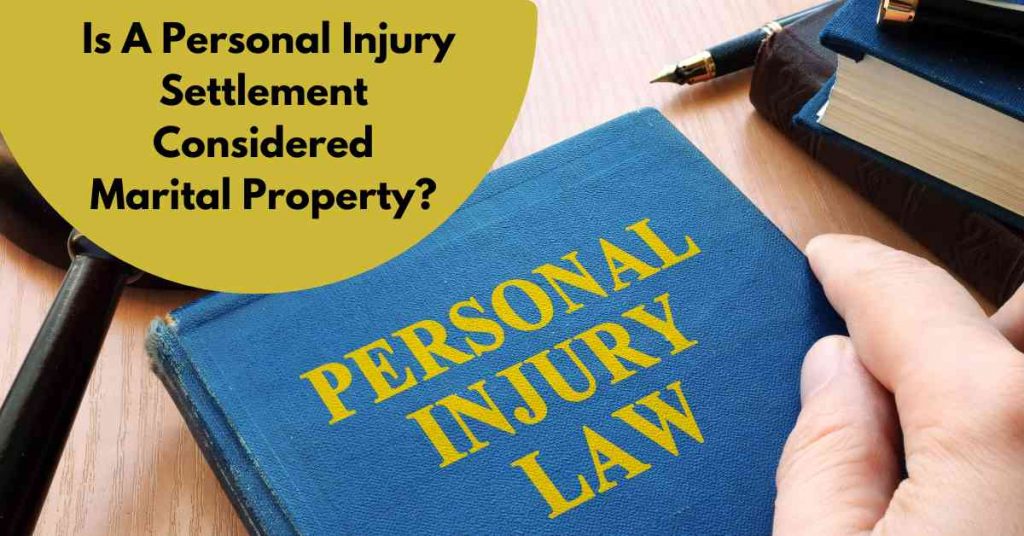Is A Personal Injury Settlement Considered Marital Property?

Is A Personal Injury Settlement Considered Marital Property? Personal Injury Settlement and Marital Property- Understanding the Legal Implications.
Personal injury settlements are financial compensations awarded to individuals who have suffered harm or injury due to the negligence or wrongdoing of another party. Classifying a personal injury settlement as marital or separate property in divorce or separation becomes a critical legal question.
This article will explore the complexities surrounding personal injury settlements and their classification as marital property, providing a comprehensive understanding of their legal implications.

- Section 1: Marital Property vs. Separate Property
- Section 2: Personal Injury Settlements and Their Classification
- Section 3: Factors Influencing Classification
- Section 4: Legal Approaches and Precedents
- Section 5: Protecting Personal Injury Settlements
- Final Verdict
- FAQs about A Personal Injury Settlement Considered Marital Property
- Q: Is a personal injury settlement considered marital property?
- Q: What factors determine whether a personal injury settlement is marital property?
- Q: Can a personal injury settlement be partially considered marital property?
- Q: How can I protect my personal injury settlement in a divorce?
- Q: What should I do if I have concerns about my personal injury settlement in a divorce?
- Bottom Line
Section 1: Marital Property vs. Separate Property
Marital Property:
Marital property generally refers to assets acquired during a marriage. In many jurisdictions, marital property is subject to division between spouses upon divorce or separation, usually through the principles of equitable distribution or community property laws.
Separate Property:
Separate property typically includes assets one spouse owns before marriage or acquired individually during the marriage, often through inheritance or gifts. So separate property is generally exempt from division during divorce proceedings.
Here are the differences between marital property and separate property presented in a spreadsheet format:
| Marital Property | Separate Property | |
| Definition | Assets acquired during the marriage or considered joint property | Assets owned by one spouse before the marriage or acquired through specific means |
| Ownership | Owned jointly by both spouses | Owned individually by one spouse |
| Examples | Family home, joint bank accounts, retirement accounts, vehicles, personal belongings | Property owned before marriage, inherited assets, gifts received by one spouse during marriage |
| Division in Divorce | Subject to division between spouses during divorce proceedings | Subject to a division between spouses during divorce proceedings |
| Legal Requirements | Determined by state laws and regulations | Typically retained by the owner's spouse |
| Commingling of Assets | Generally, separate property is not subject to division and remains with the owning spouse. | Generally, the burden of proof lies with the claiming spouse to establish separate property. |
| Treatment in Divorce | When separate property is mixed with marital property, it can be considered marital property. | Commingling may make it difficult to distinguish separate property from marital property. |
| Inheritance | Both spouses are generally equally responsible for marital debts incurred during the marriage. | Separate property is typically passed down to the designated beneficiaries |
| Liability | Separate property is generally not liable for debts solely belonging to the other spouse. | Marital property may be distributed according to intestacy laws or the deceased's will. |
Please note that the specific laws and regulations governing marital and separate property can vary depending on the jurisdiction. It's recommended to consult with a qualified family law attorney to understand the laws applicable to your situation.
Read Also: Can I Change My Personal Injury Lawyer?
Section 2: Personal Injury Settlements and Their Classification
Origin of the Settlement:
The origin of the personal injury settlement plays a significant role in its classification. The settlement may be considered separate property if the injury occurred before the marriage. However, if the injury occurred during the marriage, the settlement may be subject to division as marital property.
Components of the Settlement:
Personal injury settlements often include various components, such as compensation for medical expenses, lost wages, pain and suffering, and future care costs. Depending on the jurisdiction, different components may be subject to different classification rules, further complicating the determination of marital or separate property.
Allocation of Damages:
Sometimes, a personal injury settlement may allocate damages for specific purposes, such as medical expenses or loss of earnings. The allocation of damages can influence the classification of the settlement, with the portion designated for personal injury being more likely to be considered separate property.
Section 3: Factors Influencing Classification
State Laws:
The classification of personal injury settlements varies significantly depending on the state or country's laws governing marital property. Some jurisdictions consider all or a portion of the settlement as marital property, while others treat it as separate property.
Commingling of Funds:
If the personal injury settlement funds are commingled with marital assets, such as depositing the settlement into a joint bank account, it can complicate the classification process. Commingling may lead to an argument that the settlement has been transformed into marital property.
Purpose and Intention:
The purpose of the personal injury settlement can influence its classification. For example, if the settlement covers joint marital expenses, it may be more likely to be considered marital property.
Contribution of Spouses:
In some jurisdictions, the extent to which the non-injured spouse contributed to the injured spouse's recovery, such as by providing physical care or emotional support, may be a factor in determining the classification of the settlement.
Section 4: Legal Approaches and Precedents
Equitable Distribution:
In jurisdictions following the principle of equitable distribution, personal injury settlements may be subject to a decision based on factors such as the duration of the marriage, each spouse's financial situation, and contributions to the marital partnership.
Community Property:
Community property states generally consider personal injury settlements obtained during the marriage as community property, subject to equal division between spouses.
Hybrid Approaches:
Some jurisdictions adopt hybrid approaches that consider the injury's timing, the settlement's purpose, and the allocation of damages to determine the classification and division of personal injury settlements.
Section 5: Protecting Personal Injury Settlements
Prenuptial and Postnuptial Agreements:
Spouses can protect personal injury settlements through prenuptial or postnuptial agreements that clearly outline the classification and treatment of such settlements in divorce or separation.
Structured Settlements:
Structuring a personal injury settlement as a series of payments over time, rather than a lump sum, may help safeguard the funds and potentially minimize the risk of them being classified as marital property.
Consultation with Legal Professionals:
Seeking advice from experienced family law attorneys can provide crucial guidance on protecting personal injury settlements during divorce or separation proceedings. Legal professionals can assist in navigating complex laws and advocating for the proper classification of the settlement.
Final Verdict
Classifying personal injury settlements as marital or separate property is a complex legal issue that varies depending on jurisdiction and specific circumstances. While general principles guide the determination, factors such as the origin of the settlement, allocation of damages, and state laws significantly influence the classification.
Protecting personal injury settlements may involve:
- Understanding practical legal approaches.
- Employing agreements.
- Considering structured settlements.
- Seeking professional legal counsel.
Individuals involved in personal injury settlements must consult with experienced family law attorneys to protect their rights and interests during divorce or separation proceedings. By understanding the legal implications and taking proactive measures, individuals can navigate the complexities surrounding personal injury settlements and work towards a fair and equitable resolution.
FAQs about A Personal Injury Settlement Considered Marital Property
Here are some frequently asked questions (FAQs) about whether a personal injury settlement is considered marital property:
Q: Is a personal injury settlement considered marital property?
Ans: In most cases, personal injury settlements are not considered marital property. Marital property typically includes assets acquired during the marriage, while personal injury settlements are often considered separate property. However, laws can vary depending on the jurisdiction, and there may be exceptions or specific circumstances where a personal injury settlement could be subject to division in a divorce.
Q: What factors determine whether a personal injury settlement is marital property?
Ans: Whether a personal injury settlement is considered marital property depends on various factors, including jurisdictional laws and the specific circumstances surrounding the settlement. Generally, if the settlement compensates for individual pain, suffering, or loss, it is more likely to be considered separate property. However, if the settlement funds are intended to compensate for marital losses or joint expenses, a portion of it may be subject to division in a divorce.
Q: Can a personal injury settlement be partially considered marital property?
Ans: A personal injury settlement may be classified as marital property if it compensates for joint losses or expenses during the marriage. In such cases, a portion of the settlement can be divided between spouses during a divorce. However, the remaining part of the settlement, compensating for individual pain, suffering, or personal losses, would generally be considered separate property.
Q: How can I protect my personal injury settlement in a divorce?
Ans: In a divorce, you must keep clear records of your personal injury settlement and how it compensates for personal losses. This may include retaining copies of settlement agreements, medical records, and other relevant documents. Consulting with a family law attorney specializing in personal injury settlements can provide tailored advice on protecting your settlement.
Q: What should I do if I have concerns about my personal injury settlement in a divorce?
Ans: A family law attorney can help you understand how a divorce will affect your personal injury compensation. They can guide you based on the laws and regulations specific to your jurisdiction. The attorney will evaluate your case, study the settlement paperwork, and advise you on protecting your rights.
It's important to remember that the treatment of personal injury settlements can differ based on jurisdictional laws. Additionally, it depends on the unique circumstances of your case. Seeking professional legal advice is essential to obtain accurate and personalized guidance tailored to your situation.
Bottom Line
In conclusion, jurisdictional rules and the circumstances surrounding a personal injury settlement determine whether it is marital property. In general, courts do not consider personal injury settlements as marital property in the context of divorce. Marital property typically encompasses assets acquired during the marriage, while separate property often refers to personal injury settlements.
However, it's important to note that there can be exceptions to this general rule. In certain situations, a divorce may involve dividing a portion of the personal injury settlement. This applies if it can be demonstrated that the settlement payments were meant to compensate for losses or expenses shared inside the marriage.
Consulting a qualified family law attorney is crucial to understanding jurisdiction-specific laws and regulations. They can provide accurate advice based on your circumstances. Moreover, they can assist in navigating the complexities of determining whether a personal injury settlement should be classified as marital or separate property.
Each case is different. Legal experts can provide personalized advice based on your location's laws and the specifics of your situation. If you seek professional advice, you can ensure receiving accurate and informed guidance. This guidance relates to treating personal injury settlements specifically in the context of marital property.

Recommendation